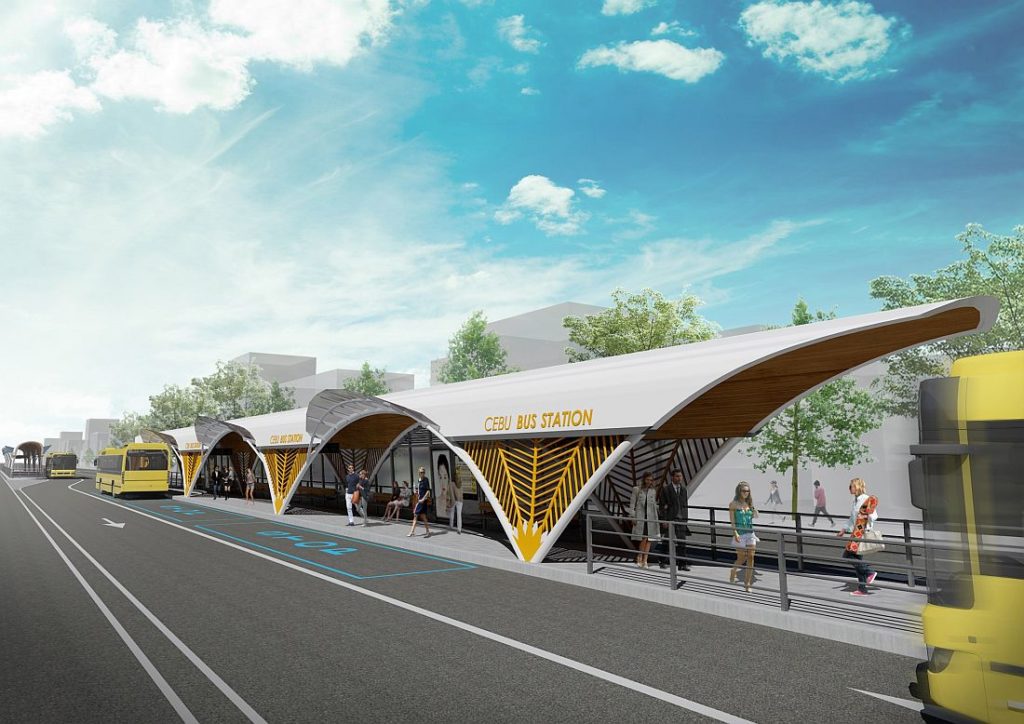
An artist’s perspective of the Bus Rapid Transport project in Cebu City.
Business leaders in Cebu welcomed the proposal of the Department of Transportation (DOTr) for a “basket of solutions” to the traffic woes in Metro Cebu.
The Integrated Inter-modal Transport System (IITS) proposed by the DOTr to be implemented in Metro Cebu includes both the Bus Rapid Transit (BRT) and Light Rail Transit (LRT) projects, which have long been debated among local officials.
The Cebu Chamber of Commerce and Industry (CCCI) said having this kind of synchronized transportation should help businesses which have been suffering from economic losses brought by traffic congestion.
“This multi-faceted set of infrastructure investments when complemented with non-infrastructure initiatives can hopefully ensure the smooth flow of people, vehicles, goods, services and investments in the island of Cebu,” CCCI President Antonio Chiu said in a statement.
At the same time, the CCCI looks forward to the collaboration of all stakeholders for the quick implementation of these set of projects which also include a monorail project and a point-to-point (P2P) bus system.
The DOTr earlier said they hoped that the IITS would already achieve partial operability within one and a half to two years.
The Japan International Cooperation Agency (JICA) has earlier pegged Cebu’s economic losses at P1.1 billion a day due to traffic congestion.
The CCCI and other business organizations in Cebu have been asking government to implement solutions to solve or at least mitigate the traffic woes in the metropolis.
The CCCI also earlier issued a statement supporting the implementation of the Cebu BRT project with the condition that it should include road widening components.
For several months, local officials have been debating whether or not to implement the Cebu BRT project which is being pushed by Cebu City Mayor Tomas Osmeña.
On the other hand, the Office of the Presidential Assistant for the Visayas (OPAV) wanted the LRT to be implemented in Cebu saying the BRT system will just worsen the traffic situation considering the city’s narrow roads.
The IITS was borne out of the DOTr’s inspection of the 23-kilometer BRT route last month.
Among those considered in identifying the projects under the IITS were Metro Cebu’s road profile and the fast-growing need for efficient mass transport systems in bigger and inter-connected cities such as Cebu, Mandaue, Lapu-Lapu, and Talisay, as well as neighboring municipalities.
For their part, the Mandaue Chamber of Commerce and Industry (MCCI) also expressed its support for DOTr’s IITS proposal.
“We are elated by the recent developments concerning DOTr’s plan to implement an Inter-modal Transport Network on Cebu island. This will certainly alleviate the worsening traffic condition in Metro Cebu and bring about economic progress,” said MCCI Vice President for External Affairs Steven Yu.
While he said they are not aware of the details of the proposal, Yu said they hope that appropriate and sufficient studies are in place for each of the projects under the IITS.
Hiring of qualified consultants, and doing stakeholder consultations should also be observed, he added.
Glenn Soco, immediate past president of the MCCI, also said that the IITS, with its differentinfrastructure projects is a good proposal to address traffic.
“There’s really no single shot solution to solve traffic. So it has to be an integrated and coordinated solution. And I think that is what the DOTr is proposing – a basket of solutions,” he told CDN.
And with bigger, long-term projects like the BRT and LRT, Soco said it is also important to for government to implement smaller and short-term solutions for traffic congestion.
Soco, who is also the chairman of the infrastructure development committee of the Regional Development Council (RDC) in Central Visayas, said they are also doing their part in the RDC.
Among the proposals that were discussed and endorsed by the RDC is the creation of the Metro Cebu Traffic Management Council (MCTMC) – a body that will discuss traffic issues metro-wide.
“You can’t solve traffic by looking at just one local government unit. There has to be a personality that covers Metro Cebu that can sort of coordinate with the DOTr in the national government,” Soco said about the MCTMC.
In their statement, the CCCI also put in their support for this proposal of the RDC.
“We believe that having an oversight body consisting of relevant government agencies with private/business sector representatives promises to be an institutional mechanism to address traffic management in the metropolitan area in general and alleviate the monstrous traffic congestion that has affected all sectors of society and has even pushed foreign and local investors away from Cebu,” the CCCI said.
The chamber added that the challenge is to “walk the talk” and translate policies and guidelines into strict observance of basic laws and regulations, speedy and smooth implementation of infrastructure projects.
At the same time, the CCCI said the MCTMC should have clear accountability spelled out and should exercise transparency in its actions and decisions.